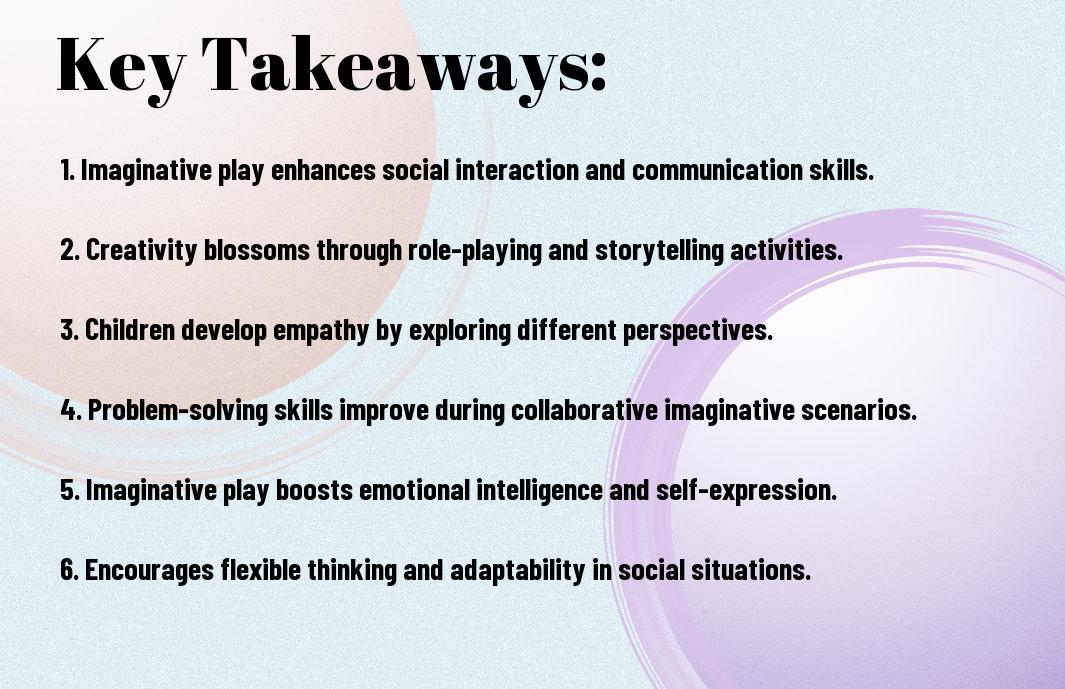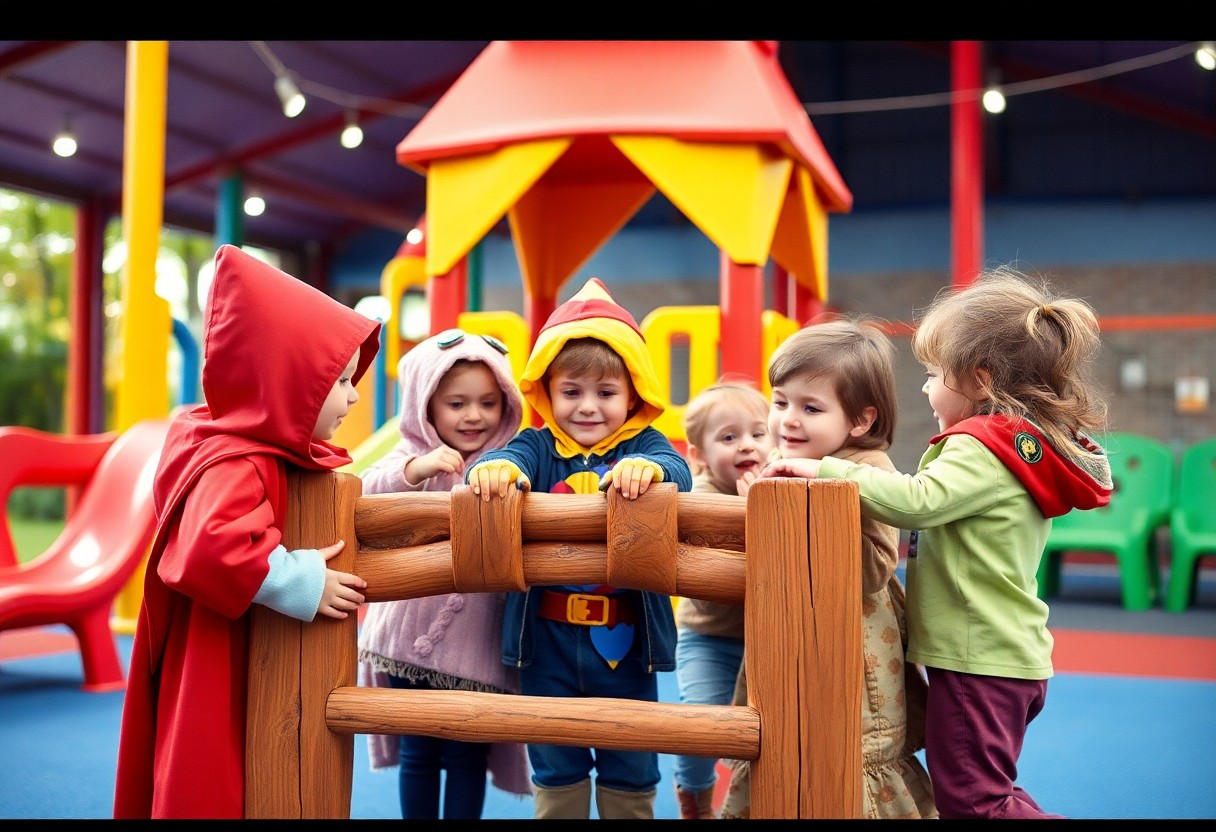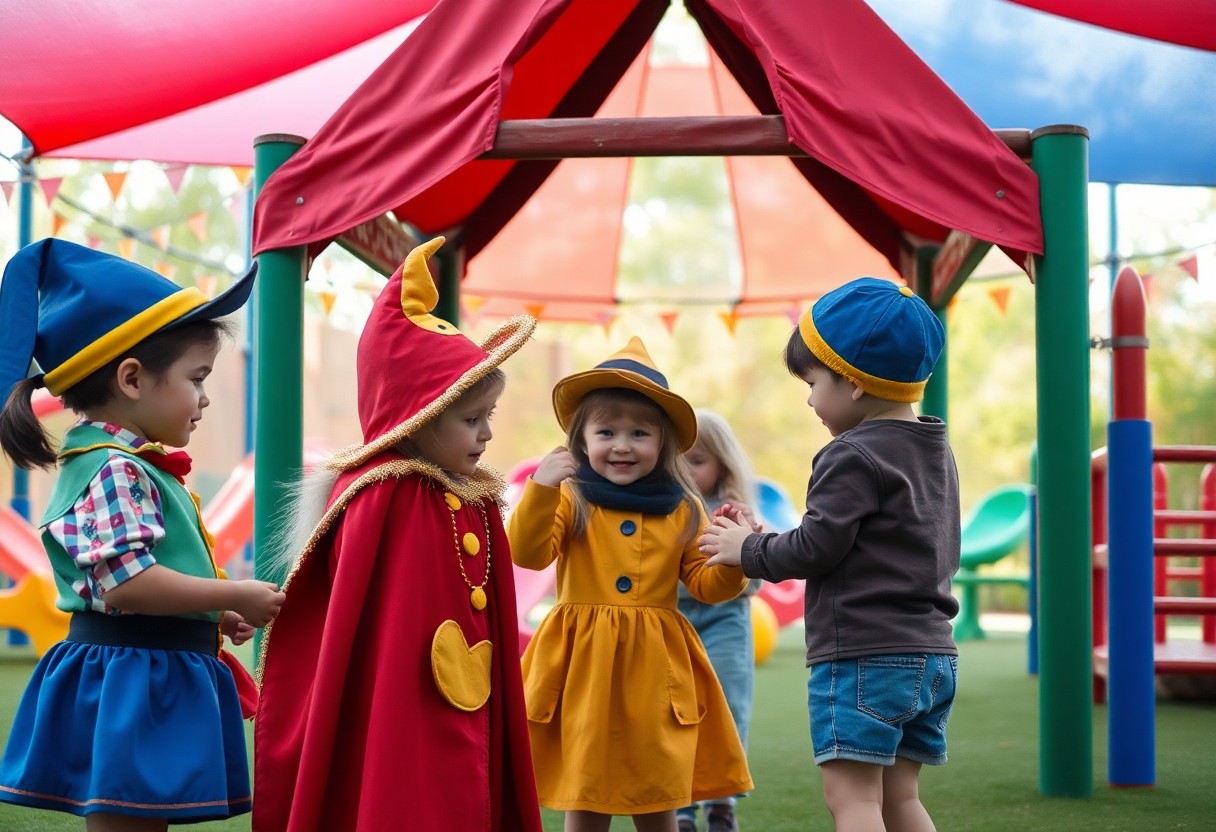You may not realize it, but engaging in imaginative play is important for developing your child’s social skills and creativity. When your little one participates in pretend scenarios, they learn to navigate complex social interactions, express emotions, and think outside the box. This playful exploration not only fosters problem-solving abilities but also builds empathy and collaboration skills that are vital for their future relationships. In this blog post, you will discover how to cultivate imaginative play in your child’s life and unlock their full potential.
Key Takeaways:
- Imaginative play fosters imperative social skills by facilitating interactions and encouraging collaboration among children.
- Creative role-playing enables children to explore diverse perspectives and enhance their problem-solving abilities, thus promoting cognitive development.
- Engaging in imaginative scenarios allows children to express emotions and develop empathy, contributing to emotional intelligence and social relationships.


The Intricacies of Imaginative Play
Defining Imaginative Play: More than Just Make-Believe
Imaginative play goes beyond mere make-believe; it encompasses a broad spectrum of activities that stimulate creativity and problem-solving skills in your child. You might witness your little one transforming a cardboard box into a spaceship, launching on intergalactic adventures. In these moments, children are not just pretending; they are actively constructing complex narratives and exploring different personas. Studies show that during imaginative play, children often negotiate rules, roles, and outcomes, which significantly enhance their cognitive abilities and foster social interactions. This process equips them with critical thinking skills, enabling them to navigate challenges both in play and real life.
Moreover, imaginative play allows for the exploration of emotions and social scenarios in a safe environment. When your child plays out various roles, they might encounter situations that mirror real-life challenges, such as sharing toys or resolving conflicts with friends. They experiment with different responses to these situations, allowing them to understand diverse perspectives and develop empathy. This form of play is foundational in building emotional intelligence, as children learn to identify and articulate their feelings while also being attuned to the emotions of others. By engaging in imaginative tasks, your child also sharpens communication skills, enhancing their ability to express thoughts and feelings effectively.
Recognizing that imaginative play is not just idle fun but a core component of childhood development supports the idea that you can intentionally create environments that encourage this form of play. Simple adjustments, such as providing diverse materials for play or setting up themed areas, can significantly enrich your child’s imaginative experiences. By facilitating opportunities for this type of engagement, you not only bolster their creativity but also establish a foundation for resilience, adaptability, and social competence that will benefit them throughout their lives.
The Role of Fantasy Scenarios in Child Development
Fantasy scenarios serve as a rich terrain for children to process their realities. In these narrative spaces, children often explore themes of conflict, cooperation, and identity. For instance, through a pretend game of being superheroes, they can confront their fears and grapple with concepts of power, justice, and responsibility. Engaging in these narratives enables children to simulate outcomes and develop strategies for resolving issues—it’s a rehearsal of sorts for real-world interactions. You might find that when your child role-plays, they are not just entertaining themselves but sculpting their understanding of social norms and ethical behavior.
Moreover, fantasy play encourages resilience. In imaginary worlds, the stakes are often manageable, allowing children to encounter failure and learn from it without real-world repercussions. For example, if your child pretends to be a knight who gets defeated in battle, they can try again and incorporate new tactics in their next play session. This cycle of trial and error builds an intrinsic motivation to persist, cultivating self-confidence and adaptability. The process of creating and navigating their fantasy scenarios prepares them to encounter challenges more effectively as they grow and engage with their peers.
By establishing a safe and varied environment for fantasy play, you provide children with the tools they need to express fears, hopes, and dreams. Encouraging your child to create and participate in fantasy scenarios means you’re also nurturing their imagination, critical thinking, and emotional resilience—skills they will draw upon well into their futures.
Social Skills Unleashed: The Connection between Play and Interaction
Building Empathy Through Role-Playing
Engaging in role-playing activities offers a profound avenue for developing empathy, a vital social skill. When you step into someone else’s shoes, whether by acting out a different character in a play or simulating a real-life scenario, you begin to understand perspectives that are not your own. For example, children playing a game where one takes on the role of a doctor and another as a patient can lead to a deeper understanding of health issues and emotional responses. You find yourself not only verbalizing the concerns of that character but also internalizing their feelings, which enriches your emotional intelligence. This kind of imaginative play enables you to recognize and respect the emotions of others, ultimately fostering a more cohesive social environment.
Empathy extends beyond mere pretend games; it roots itself in everyday interactions as well. Studies suggest that children who frequently engage in role-playing activities exhibit enhanced empathetic responses in real-life situations, influencing their ability to form friendships and resolve conflicts effectively. As you practice these interactions, you’ll discover that your ability to interpret non-verbal cues, such as facial expressions and body language, significantly improves. Simple role-playing scenarios can even pave the way for discussing complex emotional issues, establishing a framework for open communication. In this way, your imaginative play acts as an incubator where empathy is both nurtured and expressed.
Through continuous engagement in these empathic role-playing experiences, you gradually build a repertoire of social strategies. By mimicking behaviors and emotions, you strengthen your cognitive and emotional muscle, which translates into real-life situations where empathy is paramount. You’re not just learning how to react to the feelings of others; you’re also developing a comprehensive understanding that guides your interactions and relationships, ultimately enhancing your capacity to maintain a balanced social life.
Navigating Social Dynamics in Group Settings
Within group settings, imaginative play provides an necessary platform for practicing social dynamics. These environments are often a microcosm of the real world, teeming with diverse personalities and varying social cues. The act of joining together to create a shared narrative allows you to experience firsthand the importance of negotiation, compromise, and collaboration. You quickly realize that, in order to contribute effectively to the group, you must communicate, listen actively, and adapt to the evolving dynamics of play. Thus, imaginative play becomes the stage where you can hone these skills in a low-stakes environment.
In group scenarios, conflicts are inevitable, and navigating them can be a learning experience. When disagreements arise during play, you learn to articulate your point of view while remaining respectful of others’ opinions. This process promotes critical conflict-resolution skills, as you practice finding common ground or devising alternative solutions that work for everyone involved. Studies have shown that children who engage in collaborative play tend to develop better problem-solving skills, often emerging with a more resilient mindset toward challenges. Your experiences during these moments of tension in play can significantly contribute to how you handle similar situations outside the play context.
Group play also encourages you to take on various roles within the social hierarchy, whether as a leader or a supporter. You will discover the nuances of influence, as some individuals naturally take charge while others may shine as the glue that holds the group together. Each interaction becomes a lesson in observing how personality traits and social skills impact group dynamics. These insights are invaluable; as you transition out of play and into real-world interactions, the lessons learned during imaginative play empower you to approach social settings with confidence and adaptability.
There’s a broader significance to understanding social dynamics in group settings through imaginative play. Research indicates that children who participate in group play are better equipped to handle complex social structures, such as those found in school and future workplace environments. Each group interaction serves as a rehearsal for the larger stage of society, where teamwork and collaborative problem-solving are necessary for success. Your ability to thrive in these environments highlights the importance of imaginative play in fostering the next generation of socially adept individuals.
Creativity Beyond Boundaries: The Impact of Play on Innovative Thinking
Imaginative Play as a Catalyst for Creative Problem Solving
Engaging in imaginative play sparks innovative problem-solving abilities, providing a playground for your mind to explore unique solutions. For example, you might find yourself in a scenario where the only way to escape a pretend alien invasion is by inventing a device using random household items. This exercise in creativity not only requires you to think outside the box but also pushes you to reassess your resources and utilize them in unexpected ways. Children exposed to these playful challenges tend to develop a versatile mindset, applying that flexibility to real-life situations as they grow older. Studies find that young people who engage in regular imaginative play demonstrate heightened adaptability and originality when faced with authentic challenges.
Your experiences in imaginative play enhance cognitive flexibility, which is important for effective problem-solving. In such settings, you’re encouraged to experiment with different perspectives, fostering a knack for seeing multiple angles of a situation. Think of role-playing games such as improvisational theater, where you must navigate various scenarios without a predetermined script. This unpredictability nurtures your creativity by compelling you to formulate responses on the fly, all while collaborating with others, which imbues you with confidence in your ability to navigate uncertainties. Outdoor play, where you create elaborate scenarios like using the backyard as a pirate ship, brings forth the need for teamwork and negotiation, skills that are vital for resolving conflicts in adulthood.
The impact of imaginative play extends beyond just personal development; it often leads to societal innovations. Numerous innovations—from groundbreaking technology to artistic masterpieces—originated from individuals who engaged deeply in play as children. Companies recognize this connection, with organizations like Google fostering a play-based culture that encourages brainstorming and imaginative exploration among employees. By fostering a playful spirit at work, it becomes easier to generate new ideas, strengthen collaboration, and break free from conventional thought processes.
How Inventive Play Influences Artistic Expression
Creative expression flourishes in environments where imaginative play is encouraged, allowing you to explore your artistic talents freely. The act of pretending and creating vivid worlds opens up avenues for you to express complex emotions, tell stories, and translate your feelings into visual or performative art. Whether it’s crafting sculptures from Play-Doh or engaging in theater games that stimulate verbal dexterity, the roots of your artistic sensibility are often nurtured in the uninhibited realms of playful exploration.
Take, for example, the transformative nature of activities like finger painting. This simple form of play not only taps into your tactile senses but encourages you to express your state of mind in color and shape without worrying about formality or convention. This exploration leads to a deeper connection within yourself, allowing you to understand diverse emotions and experiences through your art. Children, who devote time to imaginative activities, commonly develop portfolios that display a range of styles and techniques as they learn to trust their instincts in expressing their visual narrative.
Artistic expression woven through imaginative play serves as a tool for personal growth and self-discovery. Engaging in these activities offers you the freedom to take risks without the fear of failure. You transform your experience into art, drawing from a pool of creativity that is fully uninhibited. As creativity blooms, your artistic identity begins to solidify, paving the way for a fulfilling journey of self-expression that you can carry with you throughout your life.
For additional insights on how imaginative play enhances creativity, check out The benefits of imaginative play.
Strategies for Fostering Imaginative Play in Children
Creating an Environment that Stimulates Creativity
Your child’s environment plays a pivotal role in shaping their imaginative play experience. Begin by transforming spaces within your home into dedicated play areas filled with a variety of props and materials that inspire creativity. For instance, a simple corner furnished with costumes, dolls, blocks, and art supplies can offer endless possibilities for storytelling and exploration. The objects within this space should invite interaction and incite curiosity, encouraging your child to engage in different roles and scenarios. A well-thought-out play area not only captivates your child’s attention but also supports independent thinking and collaboration with peers.
Diversity in environments is equally important. Take your child on trips to parks, museums, and even the local grocery store, where everyday experiences become sources of inspiration for role play. Imagine a scenario where they transform a grocery cart into a spaceship or a park bench into a royal throne. These outings provide practical learning opportunities while feeding their imagination with novel ideas and experiences. Take advantage of seasonal changes as well; a blanket fort on a rainy day or a picnic in the backyard during summer can rejuvenate their desire to create stories influenced by their surroundings.
Encouraging feedback and prompts can also elevate imaginative play. Occasionally, you might suggest scenarios or ask open-ended questions, such as “What would happen if you found a magic key?” Such prompts become launching pads for their creativity. However, allow room for spontaneity and avoid overly directing their play. The more freedom they have, the more adept they will become at weaving intricate stories that mirror their thoughts and feelings, reinforcing their emotional intelligence alongside their creativity.
Incorporating Structured Play and Unstructured Exploration
Striking a balance between structured play and unstructured exploration is important in promoting a thriving imaginative landscape for your child. Structured play, like organized games or guided activities, serves as an excellent way to introduce concepts like sharing, teamwork, and following rules. It can take the form of group storytelling sessions or dramatic play with clear objectives. For example, setting up a theater performance where your child has specific roles can enhance their ability to cooperate and communicate with peers. These experiences are fundamental in helping them navigate social dynamics while allowing their creativity to blossom within a framework.
Unstructured exploration, on the other hand, invites your child to take the lead in their play experiences. This free form allows them to mess around with ideas, take risks, and develop their creative thinking without a fixed outcome. Think about opportunities like giving them a box of household items to create whatever sculpture or device they envision. Here, there are no boundaries; imbuing their play with a sense of limitless possibilities drives innovation and personal expression. Helping your child learn how to manage their playtime—navigating between exploring independently and engaging in structured activities—will hone their ability to adapt in various social situations.
Mixing both forms of play not only enhances their imaginative capabilities but also fosters crucial life skills. You can try scheduling specific times for structured play where friends can join in and then following up with unstructured time when they can experiment solo. Tailoring this balance to your child’s preferences and strengths encourages them to thrive emotionally and socially while growing increasingly inventive in their play scenarios. For more insights on this topic, consider checking out How to Encourage Social Skills Through Pretend Play.

The Long-Term Benefits: From Childhood to Adulthood
Lifelong Social Skills Developed Through Early Play
Your early experiences with imaginative play lay a solid foundation for the social interactions you will encounter throughout your life. Engaging in pretend play offers you opportunities to navigate complex social situations while experimenting with different roles. As you negotiate rules, share props, and connect with your peers, your abilities to communicate, collaborate, and empathize flourish. Studies show that children who frequently engage in play-based activities often possess advanced social skills by the time they enter adulthood, forming lasting relationships and networks in their personal and professional lives.
Think of those moments when you transitioned from one role to another, perhaps switching from a teacher to a doctor in your play scenario. These experiences require quick thinking and adaptability, traits that are highly valued in any social context. By engaging in such activities, you learn not only to express your thoughts but also to understand and reflect the feelings and perspectives of others. This fosters a sense of belonging and encourages you to cultivate your emotional intelligence, a vital skill set that transcends the playground and seeps into your work and family life.
The beauty of imaginative play lies in its ability to instill a sense of confidence in social settings. As you gain comfort in taking turns, sharing, and resolving conflicts through play, you’re building a mental toolkit that becomes invaluable as you transition into adulthood. According to research conducted by the American Academy of Pediatrics, those who engage in imaginative play during childhood are significantly more likely to develop strong leadership qualities and effective interpersonal skills, making it easier for you to forge connections, navigate team dynamics, and thrive in your career.
The Correlation Between Play and Professional Creativity
Your capacity for creativity is nurtured during those carefree days of imaginative play. The essence of playful interaction fuels divergent thinking, encouraging you to explore multiple solutions to challenges rather than sticking to conventional methods. In fact, renowned psychologist Sir Ken Robinson highlights that such play plays a pivotal role in fostering creativity, a trait that is increasingly valuable in today’s workforce. As you embrace the freedom of creativity during childhood, you inadvertently prepare to tackle complex problems with innovation in your career.
Consider some of the most impactful businesses and thought leaders today—many started their journey with imaginative play. Companies like Google and Apple place significant emphasis on fostering creativity in their workforce, often integrating play into their work culture. When you build on a foundation of imaginative play, you develop not only the ability to think outside the box but also a mindset that is open to exploration and experimentation. This orientation helps you redefine problems and come up with avant-garde solutions that can have a significant impact on your professional landscape.
You might find that the lessons learned through early play resonate even in high-stakes environments, granting you the confidence to pitch an idea or lead a team brainstorming session. Emphasizing creativity can catalyze innovation and collaboration, leading to breakthrough moments and success in your projects. The connections between early playful experiences and your adult work life are clear—a rich history of imaginative play can help you achieve remarkable heights of creativity and problem-solving ability.
To wrap up
Conclusively, engaging in imaginative play is not just a fun activity for children; it is an vital component of their social development and creativity. As you encourage your child to imagine, create, and pretend, you provide them with opportunities to enhance their communication skills and learn to navigate social interactions. Through role-playing and pretend scenarios, children develop empathy by putting themselves in others’ shoes, which fosters their ability to build meaningful connections with peers. This process allows them to understand various perspectives, thus equipping them with the social skills necessary for successful relationships in the future.
Your role as a parent or caregiver in facilitating imaginative play cannot be overstated. By providing them with various props, costumes, or even simple household items that can be transformed into imaginative tools, you help ignite their creativity and allow for experiential learning opportunities. Moreover, when you engage in play alongside your child, it not only strengthens your bond but also provides an avenue for shared experiences that contribute to their emotional and social development. In essence, the more you nurture this type of play, the more you enhance your child’s confidence as they learn to express themselves and articulate their feelings, resulting in a well-rounded and adaptable individual.
Thus, prioritizing imaginative play is instrumental in shaping your child’s social skills and creative thinking. The benefits extend far beyond immediate enjoyment, impacting their academic performance, emotional intelligence, and capability to face challenges throughout life. To examine deeper into the significance of imaginative play in development, feel free to explore resources like Why Imagination and Pretend Play are Key to Development. Understanding and embracing the power of play will help you foster a nurturing environment where your child can thrive, ensuring their future success in various facets of life.
FAQ
Q: What is imaginative play and why is it important for child development?
A: Imaginative play refers to the activities where children create scenarios and roles, often mimicking real-life situations or inventing fantastical worlds. This type of play is important for child development as it fosters creativity, enhances problem-solving skills, and encourages emotional expression. During imaginative play, children learn to navigate social interactions, practice empathy, and develop communication skills, which are vital for forming relationships and functioning effectively in society.
Q: How does imaginative play enhance social skills among children?
A: Imaginative play enhances social skills by providing children with opportunities to interact with peers and engage in cooperative activities. Through role-playing scenarios, children learn to negotiate roles, share ideas, and resolve conflicts. These interactions help them understand different perspectives and emotions, which are crucial for building strong social connections. As children collaborate during play, they develop teamwork skills and the ability to communicate effectively, laying the foundation for future social success.
Q: Can imaginative play be encouraged at home, and if so, how?
A: Yes, imaginative play can be encouraged at home through various creative activities and resources. Parents can create a rich environment by providing props such as costumes, building blocks, or art supplies that inspire creativity. Setting aside dedicated time for play, participating in pretend games, and encouraging children to invent their own stories fosters an atmosphere where imaginative play can thrive. Additionally, giving children the freedom to explore their interests and supporting their creative ideas can significantly promote their social skills and creativity.


0 Comments